Cold stores Frigo Group 40 years: Interview with the founder Hein van Elderen
The company history is characterized by ‘entrepreneurship’ and ‘quality’.
Frigo Group was founded 40 years ago.
Enterprising. Full of energy. Social conscience. Inspiring and with enthusiasm. These are some of the characteristics of Hein van Elderen (1934), the founder of the Frigo Group. As a grower of, among other things, celeriac, he decided to build a cold store in Nieuw-Vennep in 1973. With this step from agriculture to storage of refrigerated and deep frozen foods, he laid the basis for the Frigo Group.
In 2013 it was forty years ago that Van Elderen started to focus on the storage of refrigerated and deep frozen foods in an enterprising, innovative and adventurous manner. 2013 Also marked the twentieth anniversary of Frigo Nieuw-Vennep and Frigo‘s-Heerenberg joining under the flag of Frigo Group. Following are some important years in the history of the Frigo Group, supplemented by historical photographs and some sayings that are typical for its founder.
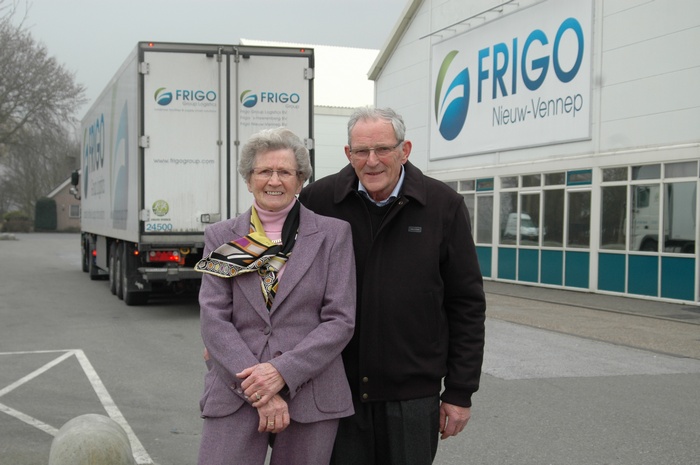
1934
Hein van Elderen was born in the Haarlemmermeer, in a family of ten. His father was a farmer in Rijsenhout. He leases 40 hectares of land and grows among other things potatoes, beetroot and wheat. After primary school, Hein does not get the opportunity to continue his studies because he is needed on his family’s farm. At the time, horse and wagon played an important part in agriculture and horticulture (see picture below). At the age of 18, he goes to the ‘Middelbare Landbouw School’ (Agricultural College) at Hoofddorp. He succeeds with excellent marks, one of the best students of his year.
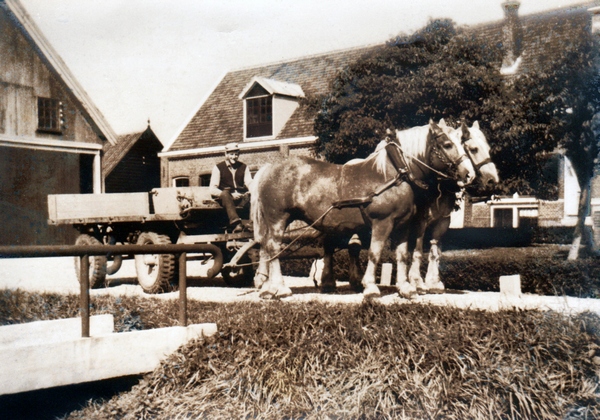
1964
At the age of 29 Hein van Elderen marries Ank Parlevliet. To compensate for all the years he worked for his father he is given a start capital of 14.000 guilders. The couple starts their own agriculture business on leased land on the IJweg in Nieuw-Vennep. A few years later, the cultivation of sugar beet threatens to fail because of abundant rainfall, and Van Elderen introduces the cultivation of red beetroot and celeriac into the culture plan. These alternatives work out so well that he expands their cultivation steadily by renting more and more land. Being highly innovative, he succeeds in mechanising the cultivation and processing of red beetroot and celeriac in cooperation with the University of Agriculture in Wageningen (see picture below)
Despite these innovations, many hands are still needed. Neighbours and family members help out and share in the success. Van Elderen: ‘You should not want to keep everything to yourself and you should not begrudge others. Then people will help you when you are in need.
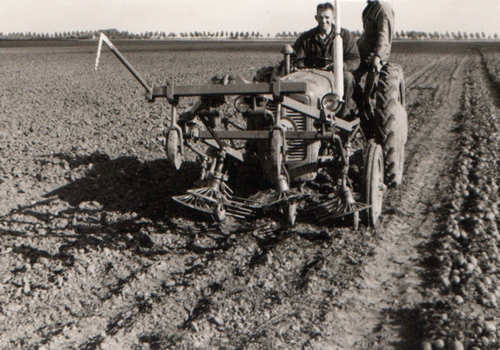
1972
Van Elderen does not like the fact that he is not able to store the celeriac and thus must sell when the product has reached its expiry date. He buys two hectares of land on the opposite side of the IJweg and builds a cold store. By himself, because Van Elderen is convinced that he does this more efficiently than a contractor. ‘By doing it myself, with my own construction team, I save at least twenty percent on the total construction costs. This approach has always been successful in beating my competitors. Moreover, the result always matches my expectations for a 100 percent’. The picture on the left shows Van Elderen (ultimate right) and three co-workers perched on top of the rafters of the future cold store. On the picture on the right, the founder poses with his daughters Wil and Margreet in the cold store under construction.
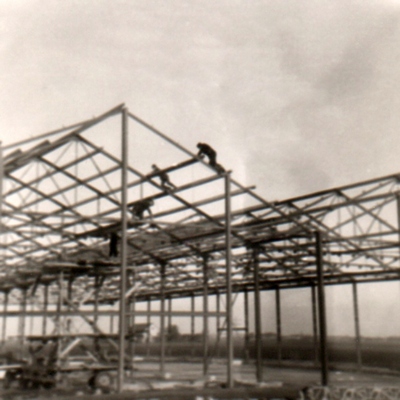 |
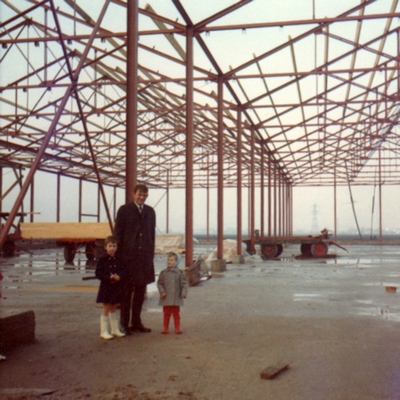 |
1973
The cold store in Nieuw-Vennep is put to use. Initially it is meant for the storage of celeriac and it has a capacity of about 16.8000 m3. The number of employees grows steadily. The turnover of employees is quite low. ‘You should treat an employee the same way you would like to be treated yourself’. The picture shows how busy the IJweg is when the harvesting and processing of celeriac coincides with the unloading of one truck after another.
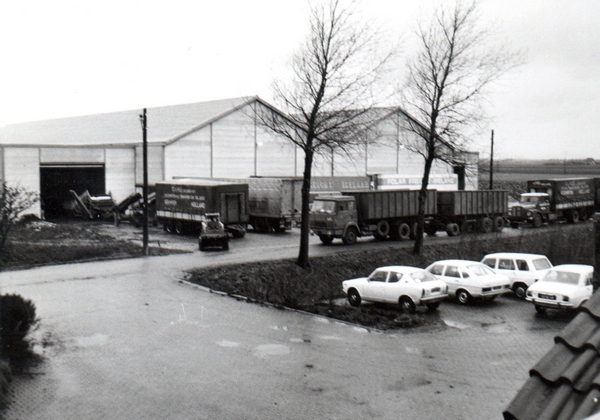
1974
In Ireland there is a large surplus of beef that is taken off the market by the European Union and needs to be deep-frozen. Van Elderen hears about this from a truck driver. He acts swiftly and travels to Ireland, where his wife does the talking because he does not speak English himself. By early spring 1974, the first truck from Ireland turns into the IJweg, loaded with beef. The picture below shows that many more will follow…
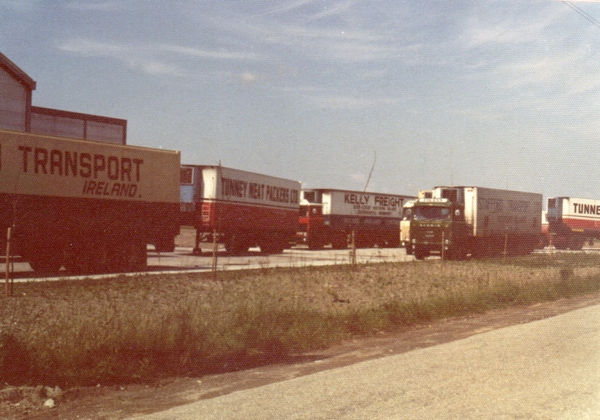
As of Easter 1974, the cold store in Nieuw-Vennep is crammed with Irish beef. It is hard work for Van Elderen and his employees, as the storage process is done manually and beef quarters are extremely heavy (see pictures below). Later the couple’s four kids: Ank, Wil, Margreet and Reinier put their shoulder to the wheel when the meat needs to be packed. The employees are well rewarded for their efforts. Van Elderen: a fixed salary is fixed poverty. Therefore, you should always give people who work hard for you something extra.
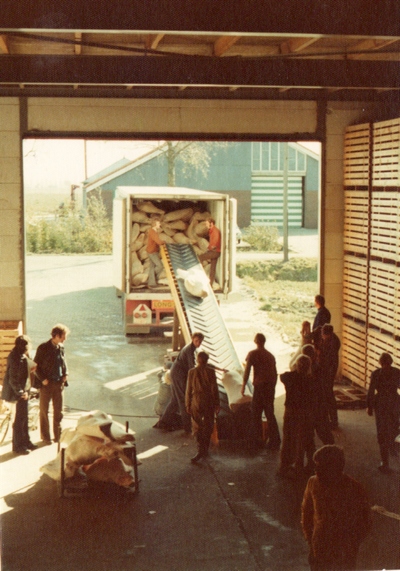 |
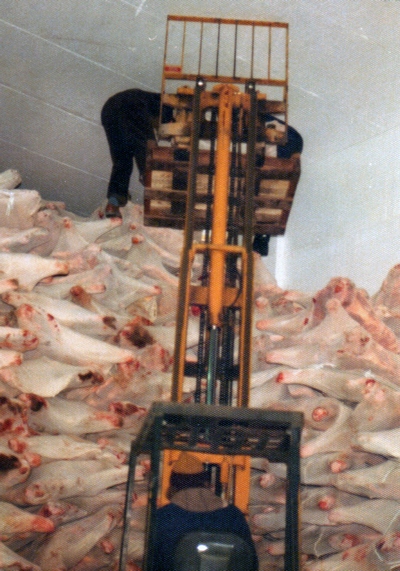 |
1975
The consequence of the huge need for space for the long term storage of, among other things, Irish beef, is that the cold store in Nieuw-Vennep has to be expanded in 1975, two years after it was opened. Again, Van Elderen does the construction himself. On the picture below, he sits on top of the future roof.
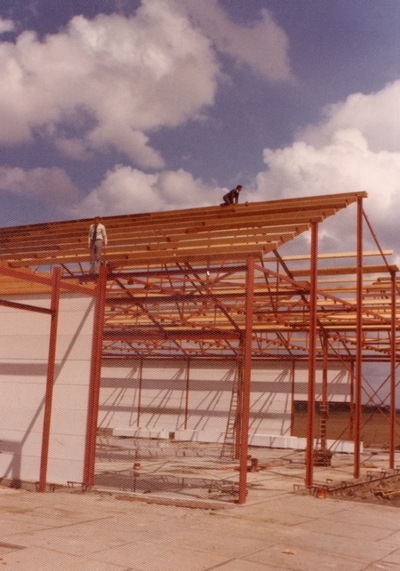
1978
Van Elderen has the opportunity to buy a piece of land in Rotterdam and together with his own construction team, he builds a cold store. ‘Eurofrigo’ starts to compete with the established order. Thanks to the quality of the service given by capable, very motivated employees who drive daily from Nieuw-Vennep to Rotterdam, more and more big clients prefer one of Van Elderen’s cold stores. His slogan: ‘A good boss is not somewhere up high, in an ivory tower, but knows exactly what happens in his company and he cares for his people’.
The pictures below show his brother Gerrit van Elderen, who is constantly available (ultimate left on the picture) at the delivery of the steel construction. The picture on the right shows Van Elderen during a meeting with two employees from the first hour, Co Bus and Dan Zwartelé. These loyal family members and employees have made a large contribution to the success of the shift from the Haarlemmermeer to the port of Rotterdam.
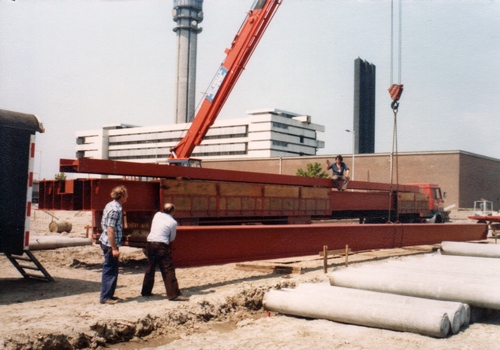 |
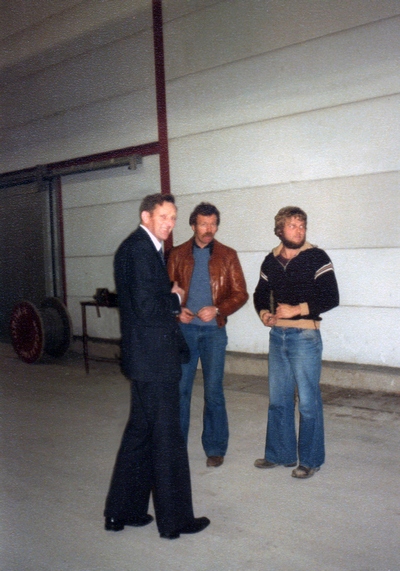 |
1979
Van Elderen expands his activities to the ports of Amsterdam and Rotterdam, among other things by offering assistance at the unloading and loading of ships as an extra service to clients. His own unloading teams manage this labour-intensive work. The goods consisting of fish, meat and chips are stacked in bulk in the ships and must be palletized manually (see picture on the right below). On the picture on the left, he leaves the ship on the gangplank with his daughter Wil. The cargo of the ship consists of boxes with deep frozen potato products from McCain from Canada.
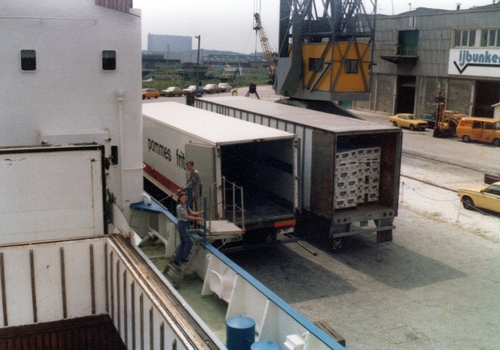 |
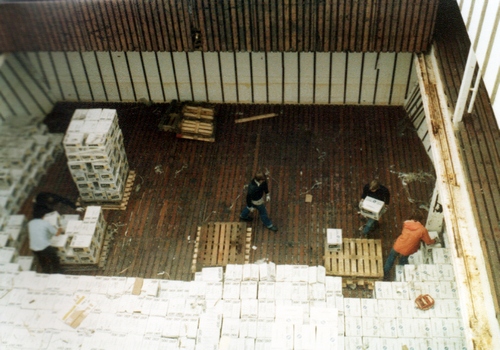 |
1982
The cold store in Rotterdam is a success as well, which causes the need for fast expansion. In 1982 Koelveem Diepvries NV, neighbour as well as competitor, is taken over.
1983
‘Roerstreek’is the name of the cold store that Van Elderen’s construction team builds in Roermond, as he has acquired some big clients in the potato processing industry. He is very happy with this move, because: ‘Agriculture is not my thing. I have always been a farmer at heart.
Reluctantly Van Elderen puts an end to the cultivation of celeriac and red beetroot. These activities can no longer be combined with the business of the extremely well functioning cold stores in Nieuw-Vennep, Rotterdam and Roermond. The picture on the right shows Van Elderen during the last harvest on his self-developed ‘krotenrooier’. His wife Ank assists him on the tractor.
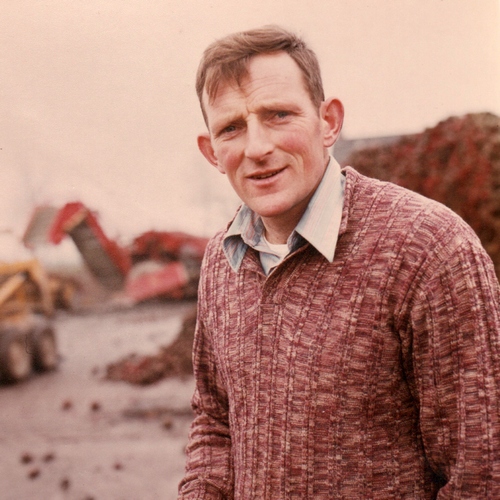 |
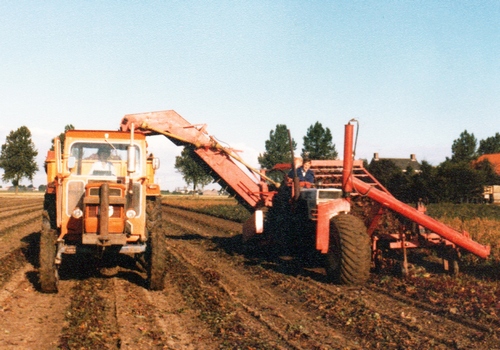 |
1988
Van Elderen sells the cold stores in Rotterdam and Roermond to the Japanese multinational Nichirei Corporation Tokyo. The reason why: ‘The Japanese company wanted to get a foothold in Europe and was willing to pay a good price. Why should I cling to it then?’ Van Elderen keeps the cold store in Nieuw-Vennep from the transaction. The Japanese demand of him not to develop any new initiatives in the field of storage of temperature sensitive products for a period of five years. Van Elderen will keep this promise. ‘An agreement is sacred to me. A man is as good as his word.
1993
A big potato processing company asks Van Elderen to build a cold store in the eastern part of the country. The choice is made for ‘s-Heerenberg. Van Elderen and his construction team build a new cold store in on the industrial estate De Immenhorst near this town in the ‘Achterhoek’. Wil van Elderen, his second daughter and her husband Henk van Veen run the company. Margreet van Elderen, the youngest daughter, exerts more and more influence on the management of the cold store in Nieuw-Vennep. On the picture below, Henk van Veen poses with his daughter Géraldine in front of the future cold store in ‘s-Heerenberg.
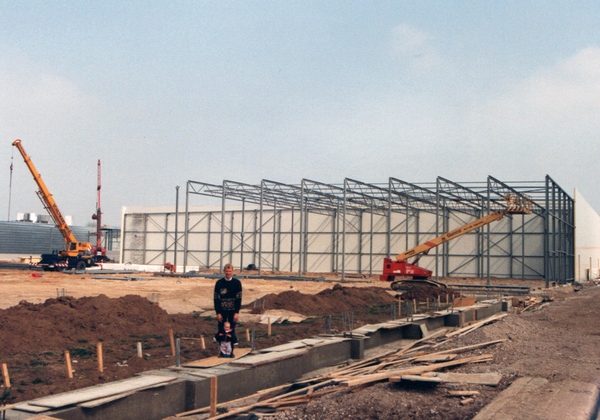
1998
Van Elderen goes international: Cold stores are being built in Lommel (Belgium) and Montigny-le-Roi (France), entirely geared for the storage of deep frozen potato products. The daily management is taken on by their son, Reinier van Elderen. The cold stores abroad operate under the name ‘Frigologix’.
1999
Margreet van Elderen takes over the cold store in Nieuw-Vennep, which has expanded to a capacity of 120.000m3 and is called ‘Frigo Nieuw-Vennep’.
Frigo ‘s-Heerenberg, also a part of the Frigo Group is taken over by Wil van Elderen and Henk van Veen. The cold store in the ‘Achterhoek’ steadily increases to a capacity of 170.000m3.
2007
Based in Abcoude, Frigo Group Logistics is added to the Frigo Group. As of now the Frigo Group can offer its clients a total solution in the shape of the complete logistic processing of deep frozen and ambient goods flows. As all branches have a Warehouse Management System (WMS) with barcode identification, tracking and tracing of products is now guaranteed at package level.
2011
With a new logo and a new internet site, www.frigogroup.com, the Frigo Group gets new branding. Van Elderen remains as main advisor to the Frigo Group, which still distinguishes itself by guaranteeing a high quality service in storage as well as in transport of refrigerated and deep frozen foods continuing in the spirit of the founder and his wife.



